Ireland Calls For Palestinian State
Ireland has announced plans to officially recognize a Palestinian state.
Following months of consultation with like-minded countries across Europe and the Middle East, Ireland made the announcement on the same day as Spain and Norway.
Three leaders of the coalition government – Taoiseach Simon Harris, Tánaiste Micheál Martin and Green Party Minister Eamon Ryan – held a press conference at Government buildings in Dublin on Wednesday morning May 22, to make the announcement (watch here on RTE).
Taoiseach Simon Harris:
Invoking Ireland’s long struggle for independence from Britain, Taoiseach Simon Harris detailed how, on Jan. 21, 1919, Ireland asked the world to recognize its right to independence.
“Our message to the free nations of the world was a plea for international recognition of our independence, emphasizing our distinct national identity, our historical struggle and our right to self-determination and justice,” he said. “Today we use the same language to support the recognition of Palestine as a state.
“Ireland today recognizes Palestine as a nation among nations with all the rights and responsibilities that entails. Ireland has for many decades recognized the State of Israel and its right to exist in peace and security. We had hoped to recognize Palestine as part of a two-state peace deal but instead we recognise Palestine to keep the hope of that two-state solution alive. Ireland’s dream is that the Israeli and Palestinian children of May 28, 2024 will grow up to be neighbours at peace. Both the Palestinian and Israeli people are inherently kind and decent. The only way to stop war and death is by tapping into those qualities in both nations. We want to thank and are honoured to recognise Palestine at the same time as our friends in Spain and Norway. We are hopeful others will do the same in the next wave.”
Tánaiste Micheál Martin
“Today’s decision to recognize the State of Palestine on May 28th is a historic moment for Ireland,” Tániste and foreign minister, Micheál Martin said. “It is our deeply-held belief that there can be no peace in the Middle East until the Israeli and Palestinian people alike enjoy the same rights to self-determination, statehood, peace, security and dignity. Recognition of Palestine is not the end of a process; it is the beginning. It is our conviction that the two-state solution remains the only viable option to secure a just and lasting peace, and a better future. I will also continue to work tirelessly on the immediate priority of securing a ceasefire in Gaza, the unconditional release of hostages, and full, safe and unhindered humanitarian access.“
Green Party Minister Eamon Ryan:
“Palestine has every right to be recognized internationally as a state and it is only right that Ireland should take this step today,” said Minister Eamon Ryan. “We hope that more countries will follow us in doing so. We also emphazize that today’s announcement does not in any way diminish our recognition of Israel’s right to exist. Instead, it should represent a first step towards the establishment of a two state solution, which represents both Israel and Palestine’s best hope for a peaceful future. While we work towards this goal, we must redouble our efforts to secure the immediate release of all hostages and the provision of humanitarian aid for all those whose lives have been destroyed by this terrible war.”
National Famine Commemoration Day
An Taoiseach, Simon Harris TD, officiated at the National Famine Commemoration in Edgeworthstown, Co. Longford on Sunday, May 19, alongside Minister for Tourism, Culture, Arts, Gaeltacht, Sport and Media, Catherine Martin TD.
Taoiseach Simon Harris
“The Great Irish Famine destroyed lives, destroyed families, and destroyed the hopes and dreams of so many,” Taoiseach Harris said speaking to those gathered at the service. “It was our national tragedy, leaving scars that never fully healed. Our national trauma, that can never be forgotten. The tragedy was national, but the lessons are global, and they compel us to honor the memory of the dead, by doing everything we can to prevent similar tragedies elsewhere.
As we reflect today on the immense suffering and resilience of those who lived and died during the Famine, let us recommit to honour their legacy not simply through remembrance but through action. We must apply the lessons of the Great Irish Famine to our world today, working to alleviate hunger and suffering wherever it exists. ‘An Gorta Mór’ is a tragedy that will never be forgotten. Our history demands that we do everything we can to make sure it is never repeated.
Catherine Martin, Minister for Tourism, Culture, Arts, Gaeltacht, Sport and Media, and Chair of the National Famine Commemoration Committee said:
The Famine tore at the very fabric of our society by decimating communities that had been so tightly knit together. Today, as we remember the victims of this cataclysm, the vital message that this commemoration sends out to the world is one of hope and renewal. The people of this country persevered through desperate suffering. Their music, songs and language survived. And we still stand here, to honour the dead, the exiled, and those left behind.
An Gorta Mór left towns and communities across the country drained of life and laughter. Today’s ceremony shows the strength of spirit in those communities, through music, art and song.
Music at the event was provided by local band Streancán and local musicians Dr Conor Ward, Noel Carberry and Meadhbh Carberry, while Amy Rooney Maguire, Emma Mihai and Aaron Ó Míacháin from St. Mary’s National School, Edgeworthstown will perform the poem An Píobaire Uillinn. The public ceremony was also broadcast on the RTÉ News channel.
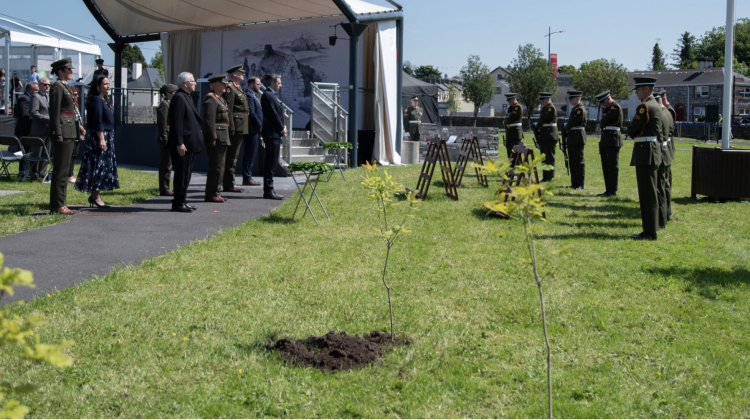
Edgeworthstown and Ireland’s 2024 National Famine Commemoration
Most narratives regarding the Great Hunger focus on its impact on the south and the west of the country. But the famine was truly a national disaster with no town or townland remaining unscathed. The midlands town of Edgeworthstown, named for the Edgeworth family, who had an estate there, was picked as the location of this year’s Famine commemoration ceremony for its further and more personal association with the Great Hunger.
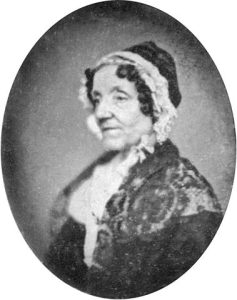
One of its residents, the acclaimed novelist, Maria Edgeworth, intervened to provide relief to the poor in her community. Edgeworth used her own fame on both sides of the Atlantic, as a writer of adult and children’s literature, to send an appeal to women in England and America to send assistance to Ireland. In addition, she donated all income from her short story, Orlandino, to the local relief committee.
Although in her 80-ieth year, she proved indefatigable in raising awareness about the real situation in Ireland. She also intervening in more practical ways. She asked the Quakers in Dublin to provide her with leather so that the local men and boys could make brogues—shoes. She pointed out that many working on the public works had no footwear. She also opened a soup kitchen, which was operated by local women.
Maria Edgeworth died in May 1849, when famine was still raging in many parts of Ireland. Today, she is rightly remembered as a gifted novelist. Her role during the Great Hunger, however, makes her one of the many unsung heroes of that tragedy.
The American Irish Historical Society will be hosting a free event featuring Professor Christine Kinealy the author of The Kindness of Strangers. Charity and the Great Hunger. Professor Kinealy will be speaking about the various people who came to Ireland’s assistance during those dark years, including the remarkable donations from Indigenous Peoples across North America.
The program will be presented jointly by the American Irish Historical Society, Ireland’s Great Hunger Institute at Quinnipiac University, the Irish Heritage Trust, and the National Famine Museum, Strokestown Park on Saturday, June 1st at 2:00 PM at the American Irish Historical Society, 991 Fifth Ave, New York, NY.
The event is funded by the Government of Ireland Emigrant Support Program.
Honouring Indigenous Aid
To mark Ireland’s National Famine Commemoration Day on May 19, the Irish Heritage Trust released a new film in its series on Ireland’s Great Hunger.
Entitled Honouring Anishinaabe, Haudenosaunee & Huron-Wendat Irish Famine Aid, the film pays tribute to the Indigenous peoples in Canada West (now Ontario) who contributed to Irish Famine relief in 1847. Based on newly discovered archival records, it tells the story of their efforts to help alleviate Irish hunger. The film features Indigenous descendants from donor communities reflecting on the compassion of their ancestors. They had donated over £170 in response to a plea for aid on St. Patrick’s Day, 1847.
In the film, Chief Laurie Carr of Hiawatha First Nation pays tribute to her ancestor George Paudash. She reads from a letter he wrote on 27 March, 1847, that includes the line, “Our hearts swell with grief at the thought of any of our fellow creatures dying for want of food.”
“This letter brings great pride and honour to me as a descendant of George Paudash,” Chief Laurie said of her fourth great-grandfather. “To know that our ancestors back in 1847 were giving even in their own hard times, we carry that today, we carry that blood memory, and we still care, we don’t want to see people suffer,” she added.
“We have heard that a dark cloud is resting upon the dominions of our Great Mother the Queen”, wrote the Chippewas of Sarnia First Nation (now Aamjiwnaang First Nation) on 3 May, 1847, “and that thousands of her white children in Ireland and Scotland are suffering from famine and disease. Our hearts have been pained by this, and we wish to express our sympathy with the sufferers and assist them a little”.
Chief Peter Nogy from Chemong Lake (now Curve Lake First Nation) committed aid in a letter written on 5 April, 1847 “to assist our friends in the British settlements for the friendship that we have received from them in former times.”
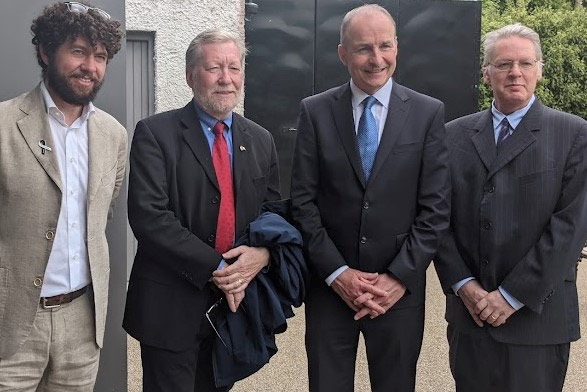
Honouring Anishinaabe, Haudenosaunee & Huron-Wendat Irish Famine Aid is part of a program of events and film releases that continues until June 2024.
It is hosted by the National Famine Museum, Strokestown Park, and Irish Heritage Trust in collaboration with the Embassy of Ireland in Ottawa and the University of St. Michael’s College in the University of Toronto. The Government of Ireland Emigrant Support Programme funds it.
Visit the National Famine Museum at Strokestown Park website to learn more.
Bobby Sands Remembered by Fellow Hunger Striker
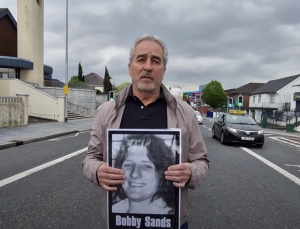
On May 5, 1981, Bobby Sands died at HM Maze Prison in Northern Ireland. He was 27 years old. In this video from May 5, 2024, during a white-line vigil commemorating the 43rd anniversary of the death of Sands, fellow hunger striker Pat Sheehan MLA remembers a meeting with Bobby in the H-Blocks as he embarked on a hunger strike.
The anniversary was also marked by white-line vigils throughout the country, where many used the opportunity to express sympathy to the Palestinian people, including a Black Flag Vigil held on O’Connell Bridge in Dublin City Centre at 2pm on Sunday, May 5. ♦

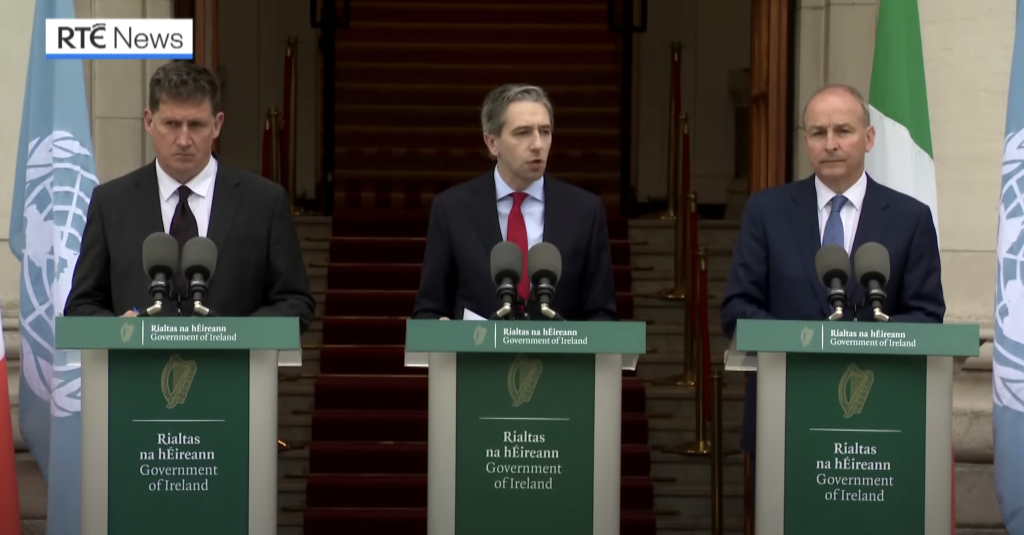
Leave a Reply